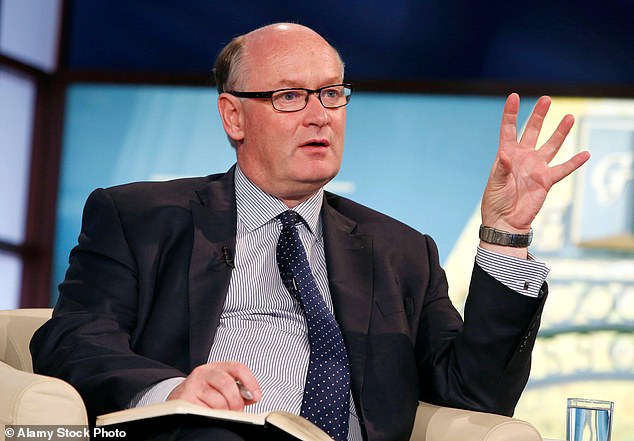- The most respected figures in the world of finance among those who will sign a letter to Jeremy Hunt
- They argue that regulations mean Britain is losing a fortune every year
- Controversial rules apply to British investment funds despite Brexit
<!–
<!–
<!– <!–
<!–
<!–
<!–
City bosses wrote to the Chancellor this week demanding he scrap bizarre EU rules that are hurting savers.
Sir Douglas Flint, chairman of investment firm Abrdn and one of the most respected figures in finance, is among more than 130 money managers who signed the letter to Jeremy Hunt.
They argue that controversial EU regulations mean Britain is losing £7bn of money each year that could be invested in green energy, fixing roads, railways and building hospitals.
The controversial rules are being applied – despite Brexit – to British investment trusts.
Trusts have a long history in the UK dating back to Victorian times, when they funded railways and other engineering projects. Today, trusts continue that tradition by investing in areas such as renewable energy, transportation and other infrastructure.

Seeking a new dawn: controversial rules apply – despite Brexit – to British investment funds


Sir Douglas Flint, chairman of investment firm Abrdn and one of the most respected figures in finance, is among more than 130 money managers who signed the letter to Jeremy Hunt.
There are 361 investment trusts in the stock market. Between them they control £267 billion in assets.
Flint and his fellow executives argue that the trusts are at risk because of rules that make it appear that investment costs are much higher than they really are.
Flint, former chairman of banking giant HSBC, told The Mail on Sunday that the rules were “a barrier to getting money for the infrastructure we desperately need”.
He added: “We need to make it attractive to invest in the UK and for people to fund infrastructure through their retirement plans.”
Justin Dowley, chairman of the FTSE 100-listed Scottish Mortgage Investment Trust, also wants Hunt to act because investment trusts are being subjected to rules drawn up by the EU. Even though the UK voted to leave the EU (meaning there is no need to apply them at all), the Financial Conduct Authority (FCA) is imposing them on companies draconian.
As a result, trusts find themselves in a strange situation where many of their costs are counted twice. Campaigners say this situation is unique to the UK.
It has sparked a sell-off in investment funds, leaving them cash-strapped and vulnerable to foreign takeovers as many of their share prices have plummeted. In his letter, published this weekend, city bosses warn Hunt that the rules are “cutting off” vital funding.
Campaigners say the regulations threaten to strangle the flow of money into areas the Chancellor hopes to boost, such as renewable energy, science and biotechnology.
The letter says: ‘This is having adverse effects on investment in the UK and is driving capital from British investors towards companies listed overseas, contributing to the poor performance of the UK stock market. Surely this cannot be allowed to continue. The UK’s interpretation is wrong. Fixing the problem by doing the same as the rest of the world could recover more than £7 billion a year of lost investment, at no cost to the taxpayer.’
It continues: “We call on the Government and the Financial Conduct Authority to take action now to end this situation immediately and return the UK to a competitive position.”


More than 130 money managers have signed a letter to Jeremy Hunt demanding he scrap bizarre EU rules that are hurting savers.
The campaign has been backed by AJ Bell, one of the UK’s largest investment platforms.
Senior politicians, including former Pensions Minister Baroness Altmann, also want reform.
Altmann, along with peers such as Liberal Democrat Baroness Bowles and Labor’s Lord Davies of Brixton, is trying to push legislation through Parliament that would remove investment trusts from these rules.
A Treasury spokesperson said: ‘We recognize the industry’s concerns and are working at pace with the FCA to reform the UK’s retail disclosure regime, including for investment trusts. We will soon provide more details about these reforms.’

